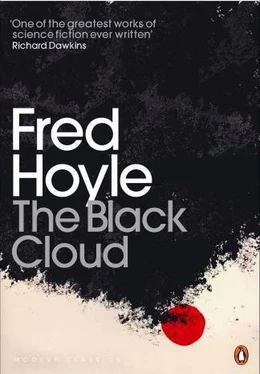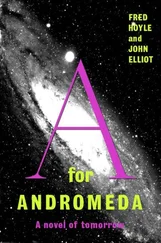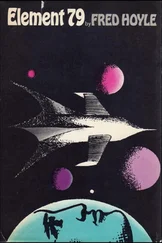Fred Hoyle - The Black Cloud
Здесь есть возможность читать онлайн «Fred Hoyle - The Black Cloud» весь текст электронной книги совершенно бесплатно (целиком полную версию без сокращений). В некоторых случаях можно слушать аудио, скачать через торрент в формате fb2 и присутствует краткое содержание. Жанр: Фантастика и фэнтези, на английском языке. Описание произведения, (предисловие) а так же отзывы посетителей доступны на портале библиотеки ЛибКат.
- Название:The Black Cloud
- Автор:
- Жанр:
- Год:неизвестен
- ISBN:нет данных
- Рейтинг книги:5 / 5. Голосов: 1
-
Избранное:Добавить в избранное
- Отзывы:
-
Ваша оценка:
- 100
- 1
- 2
- 3
- 4
- 5
The Black Cloud: краткое содержание, описание и аннотация
Предлагаем к чтению аннотацию, описание, краткое содержание или предисловие (зависит от того, что написал сам автор книги «The Black Cloud»). Если вы не нашли необходимую информацию о книге — напишите в комментариях, мы постараемся отыскать её.
The Black Cloud — читать онлайн бесплатно полную книгу (весь текст) целиком
Ниже представлен текст книги, разбитый по страницам. Система сохранения места последней прочитанной страницы, позволяет с удобством читать онлайн бесплатно книгу «The Black Cloud», без необходимости каждый раз заново искать на чём Вы остановились. Поставьте закладку, и сможете в любой момент перейти на страницу, на которой закончили чтение.
Интервал:
Закладка:
“After Kingsley’s death, and after the departure of the Cloud, it would have been unrealistic for those of us who remained at Nortonstowe to have attempted to follow our former tactics. Instead Parkinson went to London and claimed that the retreat of the Cloud was in a large measure due to our good offices. This was not at all difficult to maintain, because the real reason for the Cloud’s departure never occurred to anyone outside Nortonstowe. I have always deplored that Parkinson saw fit to malign poor Kingsley most reprehensibly, by representing him as a hot-head who had at last been deposed by force. This also was believed, since for some reason Kingsley was regarded in London and elsewhere as a thoroughly malevolent person. Kingsley’s death added further colour to this story. In short, Parkinson was able to persuade the British Government to take no action against its own nationals and to resist deportation orders for the others. Repeated attempts at deportation were in fact made, but as national affairs stabilized themselves and as Parkinson gained increasing influence in Government circles it became progressively easier to resist them.
“Marlowe, Alexandrov, and the rest, except Leicester, all stayed on in Britain. Their names may be found in the learned journals, especially that of Alexandrov who achieved great distinction in scientific circles, although his career in other directions was, I believe, a somewhat stormy one. Leicester, as I say, did not remain. Against Parkinson’s advice he insisted on returning to his native Australia. He never reached Australia, being reported missing at sea. Marlowe remained on terms of close friendship with both Parkinson and myself until his death in 1981.
“All this is fifty odd years in the past. A new generation now holds the stage. My own generation has already slipped into the shadows of this pageant we call “life”. Yet I can still see them all so clearly: Weichart, young, clever, with a character scarcely formed; the gentle Marlowe for ever puffing away at his execrable tobacco; Leicester, droll and gay; Kingsley, brilliant, unconventional, full of words; Alexandrov with his shock of hair, brilliant too and with hardly any words. It was an uncertain generation, not quite knowing where it was going. In a sense it was an heroic generation, linked imperishably in my mind with the opening chords of the great sonata that your grandmother played on that memorable night when Kingsley first divined the real nature of the Black Cloud.
“And so I reach an end, apparently in anticlimax, but not really so. I have one surprise left. The code! Originally only Kingsley and Leicester had access to the code whereby communication with the Cloud could be established. Marlowe and Parkinson believed that the code died with Kingsley and Leicester, but it did not. I acquired it from Kingsley during his last spell of sanity. I have kept it by me all these years, never knowing whether I should reveal its existence or not. This problem I am now handing on to you.
I send you my best wishes,
For the last time,
John McNeil”Epilogue
It was a cold day with driving rain, much the same sort of January day that Kingsley had experienced so many years ago, when I first read McNeil’s astonishing account of the Black Cloud. All afternoon and evening I sat before an open fire in my rooms in Queens’ College. After the conclusion, a conclusion reached in sadness, for McNeil had left us a few days earlier with the irrevocable permanency that only death can bring, I unsealed the last remaining packet. Inside was a small metal box that contained a roll of paper tape, yellowed by age. Punched in the paper were ten thousand or more tiny holes of the sort used by old-fashioned photo-electric readers. This was the code! With a flick I could have sent the paper into the fire, and in a brief second all possibility of any further communication with the Cloud would have been gone for ever.
But this is not what I did. Instead I have had a thousand odd copies of the code made up. Should I distribute them throughout the world, in which event nothing can prevent someone, somewhere, sooner or later, getting into touch with the Cloud again? Do we want to remain big people in a tiny world or to become a little people in a vaster world? This is the ultimate climax towards which I have directed my narrative.
J. B.
17 January 2021
The Black Cloud
Afterword by Richard Dawkins
Sir Fred Hoyle FRS (1915–2001) was a distinguished scientist, whose blunt, even abrasive, Yorkshire manner rubbed off on many of his science fiction heroes, including Christopher Kingsley, the lead character of this, his first and best-known novel. As an astronomer, Hoyle was famous for being wrong about the Big Bang theory of the origin of the cosmos. He was against it — the very name is his own sarcastic coining — preferring his own elegant and pugnaciously defended ‘Steady State’ theory. He was spectacularly right in his theory of how the chemical elements are forged, ultimately from hydrogen, in the interiors of stars. Indeed, many scientists feel that a serious injustice was done to Hoyle when he was denied a share in the Nobel Prize that was eventually given to others for this foundational theory. About his incursions into theoretical biology and evolutionary theory, the less said the better.
As a novelist, I would say his output was mixed. A for Andromeda , co-authored with John Elliott, shares with The Black Cloud the enormous virtue of educating the reader in scientific principles at the same time as it entertains. In particular, the book expounds the important idea — later reprised by Carl Sagan in Contact — that, if an alien civilization wished to take over the Earth, they would most likely not visit us in person (galactic distances are too great) but would send coded information by radio, which would be deciphered as the instructions for building and programming a computer. The computer would then act as the aliens’ proxy. To understand why this is so plausible is to understand some profound principles of science, and Hoyle brilliantly gets the point across.
Some of his other novels go the other extreme, and are little more than pot-boilers. But The Black Cloud is, in my opinion, one of the greatest works of science fiction ever written, up there with the best of Isaac Asimov and Arthur C. Clarke. Right from the first page, it is what used to be called a ‘rattling good yarn’, one of those stories that grabs you on page one and doesn’t let go until you finish it in the wee small hours. It helps that the book is set approximately in the present, and does not, like so much science fiction, bewilder us with strange, alien names and other-worldly customs which we don’t begin to understand until we are well into the book, by which time our busy life might have shown us something better to do than go on reading it. Hoyle’s characters love to think deep thoughts in their Cambridge rooms before a roaring log fire, and the recurring image is a delightfully comfortable one.
But the real virtue of The Black Cloud is this — without ever preaching at us, Hoyle manages, as the story races along, to teach us some fascinating science along the way: not just scientific facts, but important scientific principles. We get to see how scientists work and how they think. We are even uplifted and inspired. Let me list just a few examples of the real science — and, indeed, philosophy — that the book spins off.
Scientific discoveries are often made, sometimes simultaneously, by a convergence of more than one method. Hoyle’s black cloud is detected by direct observation through a Californian telescope, and simultaneously by indirect mathematical reasoning in Cambridge. The narrative in this early part of the book is ravishingly well-handled, climaxing with a telegram, sent from the Cambridge team to the California team. Neither side knows that the other has independently converged on the same alarming truth, and there is a goosepimpling moment when the words of the telegram ‘seemed to swell to a gigantic size’.
Читать дальшеИнтервал:
Закладка:
Похожие книги на «The Black Cloud»
Представляем Вашему вниманию похожие книги на «The Black Cloud» списком для выбора. Мы отобрали схожую по названию и смыслу литературу в надежде предоставить читателям больше вариантов отыскать новые, интересные, ещё непрочитанные произведения.
Обсуждение, отзывы о книге «The Black Cloud» и просто собственные мнения читателей. Оставьте ваши комментарии, напишите, что Вы думаете о произведении, его смысле или главных героях. Укажите что конкретно понравилось, а что нет, и почему Вы так считаете.












